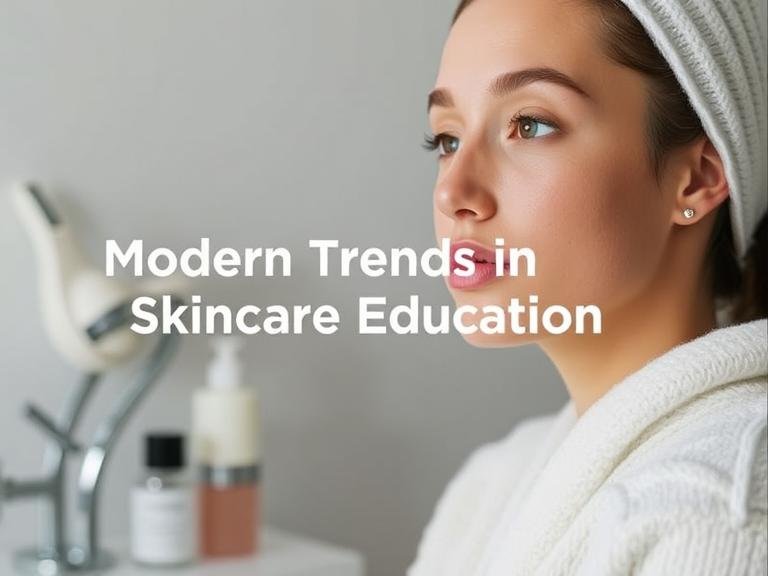Skincare education is rapidly evolving, blending advanced technologies, sustainability, and inclusive curriculum to deliver better learning experiences for future and current professionals. As the demand for skilled estheticians continues rising, understanding these trends is essential for those who want to stay ahead in the industry. Anyone seeking a fresh start or advancement in the beauty sector might consider specialized esthetician programs in Nashville to take advantage of the latest advancements in the field. With the industry’s focus shifting toward integrating science, technology, and holistic wellness, today’s skincare education has never been more dynamic or relevant.
Emerging learning formats, deeper scientific knowledge, and a broadened ethical focus help equip professionals with the modern skills needed to address clients’ unique skincare needs. These shifts are not only changing the classroom experience, but also upgrading the treatments and advice that clients receive at salons, spas, and dermatology offices. The following breakdown of leading trends showcases how future-ready education is paving the way for a more knowledgeable, ethical, and diverse beauty workforce.
AI Integration in Skincare Education
Artificial Intelligence (AI) is transforming skincare education by enabling more sophisticated, personalized learning and practice. Students now use AI-powered apps that simulate skin analysis, allowing them to get instant feedback and hands-on experience diagnosing various conditions. These AI tools help learners understand how to select treatments based on real-time assessment, mirroring how technology is used in professional settings. The result is graduates who are comfortable with emerging tech and equipped to better serve clients with advanced skincare diagnostics and tailored recommendations. According to Allure, AI-driven diagnostics have set new standards for accuracy and personalization in the beauty and skincare industry.
Emphasis on Sustainable and Ethical Practices
Environmental consciousness is becoming central in skincare education. Today’s programs teach up-and-coming estheticians how to identify responsible product formulations, eco-friendly packaging, and ethically sourced ingredients. With growing pressure from consumers for sustainable choices, estheticians must understand the environmental and social impacts of their recommendations. Coursework, workshops, and certifications now regularly cover green initiatives and ethics, encouraging future professionals to challenge wasteful practices and promote safer industry standards.
Personalized Learning Pathways
Modern skincare education tailors itself to learners’ diverse backgrounds, goals, and learning speeds. Modular, self-paced classes—often delivered online—let students specialize in advanced facial therapies or product chemistry, as suited to their career interests. Learning management systems and interactive online courses provide flexibility, helping students progress at their own pace and making continued education more accessible than ever. This trend supports a deeper, more engaged learning experience while accommodating busy lifestyles and varied educational needs.
Focus on Skin Microbiome and Barrier Health
Understanding the balance of microorganisms that live on our skin known as the microbiome has drastically shifted skincare education. Courses focus on science-backed insights regarding the skin’s barrier and the importance of protecting and restoring it. Students explore topics like probiotic skincare, how stress affects the skin’s barrier, and which products support versus disrupt this delicate ecosystem. New research published by Allure underlines the value of microbiome-supportive care, showing potential for both preventative and corrective skin routines. Understanding these fundamentals allows future estheticians to recommend gentler, more effective treatments for clients with diverse needs and sensitivities.
Incorporation of Virtual and Augmented Reality
Virtual Reality (VR) and Augmented Reality (AR) are bringing a new dimension to skincare training. With immersive VR simulations, students practice application techniques, skin assessments, and client consultations—building confidence in a risk-free digital space. Augmented reality overlays live information, like anatomy visuals, on training mannequins or real models, bridging theoretical knowledge with hands-on skill development. These technologies enhance comprehension and boost readiness for real-world client care, giving students opportunities to problem-solve in dynamic, lifelike settings.

Holistic Approach to Skincare Education
Today’s educators recognize that skin health isn’t only about topical care. Curriculum now often incorporates lessons on nutrition, psychology, sleep, and lifestyle habits—all factors that influence skin conditions. By understanding the person behind the skin, future estheticians can give clients comprehensive advice, moving beyond one-size-fits-all treatments to customized, holistic care. This trend prepares learners to view each client as unique, ensuring solutions address root causes rather than just symptoms.
Increased Emphasis on Diversity and Inclusion
Inclusivity is emerging as a major pillar in skincare education. Programs are actively developing coursework that equips students to work with a wide range of skin types, tones, and cultural backgrounds. Training now includes guidance on formulating treatments for individuals of all ethnicities and skin sensitivities, and emphasizes respectful, culturally competent care. By fostering education rooted in diversity and representation, future estheticians are better prepared to serve the needs of all clients, helping close gaps in the industry and strengthening trust with underrepresented communities.
Conclusion
The modern skincare education landscape is characterized by a fusion of technology, science, ethics, and inclusivity. These evolving trends prepare students for a future in which estheticians are not only knowledgeable but also socially and environmentally responsible. By embracing innovative learning approaches and comprehensive care philosophies, today’s estheticians are empowered to make an impact in a fast-paced, client-focused industry, ensuring they remain at the forefront of their profession.




